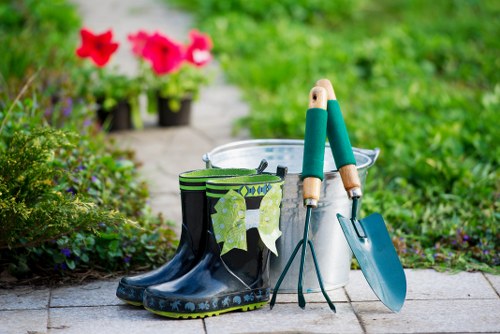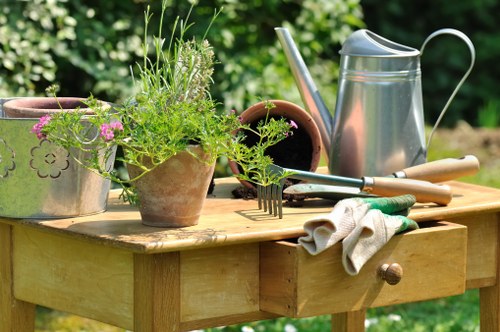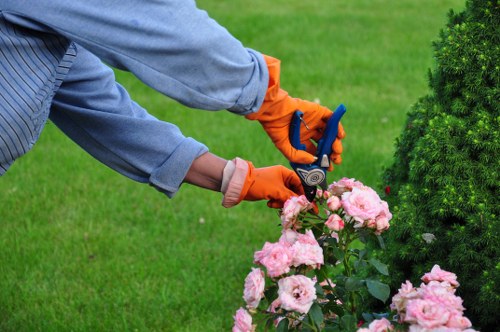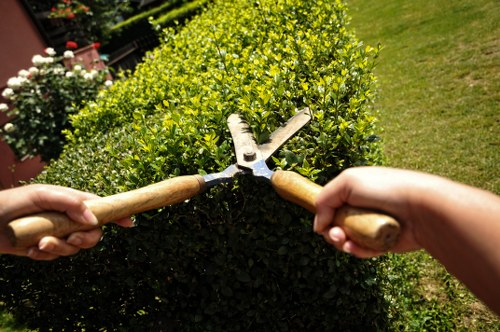Comprehensive Guide to Garden Fence Installation in Mile End

Installing a garden fence in Mile End is a fantastic way to enhance the beauty and functionality of your outdoor space. Whether you’re looking to add privacy, define your garden boundaries, or simply improve the aesthetic appeal, a well-installed fence can make a significant difference.
In Mile End, a vibrant area known for its diverse community and lush green spaces, choosing the right fence is essential. The unique characteristics of Mile End’s gardens require fence solutions that are both sturdy and stylish.
Before diving into the installation process, it’s important to consider the various types of garden fences available and how they align with your specific needs and the local environment.
Types of Garden Fences Suitable for Mile End

There are several types of garden fences to choose from, each offering different benefits:
- Wooden Fences: Classic and versatile, wooden fences can be customized to match any garden style.
- Metal Fences: Durable and low-maintenance, metal fences provide excellent security and longevity.
- Vinyl Fences: Resistant to weather and easy to clean, vinyl fences are a practical choice for busy gardens.
- Composite Fences: Combining the best of wood and vinyl, composite fences offer both beauty and durability.
Choosing the right material depends on factors such as budget, desired appearance, and maintenance preferences.
Each type of fence has its own installation requirements, which we will explore in the next section.
Wooden Fences

Wooden fences are a popular choice in Mile End due to their natural appearance and adaptability. They can be painted or stained to complement your garden’s color scheme.
When installing a wooden fence, it’s crucial to ensure that the posts are deeply set to provide stability against the wind and other elements.
Regular maintenance, such as sealing and treating the wood, will help extend the life of your fence.
Metal Fences

Metal fences offer a sleek and modern look, perfect for contemporary gardens in Mile End. They are highly durable and require minimal maintenance.
Galvanized or powder-coated metals are ideal options as they resist rust and corrosion, ensuring your fence remains in excellent condition for years.
Metal fences also provide excellent security, making them a great choice for properties that require an extra layer of protection.
Vinyl Fences

Vinyl fences are gaining popularity for their ease of installation and maintenance. They are available in a variety of styles and colors, allowing you to find the perfect match for your Mile End garden.
Unlike wood, vinyl does not require painting or staining, making it a cost-effective and time-saving option.
Vinyl fences are also resistant to pests and rot, ensuring a long-lasting barrier around your garden.
Steps to Install a Garden Fence in Mile End

Installing a garden fence involves several key steps to ensure it is secure and aesthetically pleasing:
- Planning and Measurement: Measure the area where the fence will be installed and determine the length and height of the fence needed.
- Choosing the Right Material: Select a fence material that suits your garden’s style and your maintenance preferences.
- Preparing the Site: Clear the installation area of any debris and ensure the ground is level.
- Installing Fence Posts: Dig holes for the fence posts, ensuring they are deep enough to provide stability.
- Attaching Fence Panels: Secure the fence panels to the posts using appropriate hardware.
- Finishing Touches: Add any additional elements such as gates, decorative accents, or protective coatings.
Following these steps carefully will help ensure a successful fence installation.
Now, let’s delve deeper into each step to provide a comprehensive understanding.
Planning and Measurement
Accurate planning and measurement are crucial to avoid common installation mistakes. Start by marking the boundaries of your garden to determine the exact length of the fence required.
Consider any local regulations or homeowner association guidelines that may dictate fence height or design.
Taking precise measurements will also help in estimating the materials needed, saving both time and money.
Choosing the Right Material
The material you choose will impact the fence’s durability, appearance, and maintenance needs. Consider the local climate in Mile End and how it may affect different materials over time.
For instance, wooden fences may require more upkeep in areas with high rainfall, while metal fences offer greater resistance to weather fluctuations.
Balancing aesthetics with practical considerations will help you select the best material for your garden.
Preparing the Site
Preparing the installation site involves clearing the area of any obstacles such as rocks, plants, or existing structures. Ensuring the ground is level will provide a stable foundation for the fence.
Proper preparation reduces the risk of fence panels becoming uneven or unstable after installation.
It also makes the installation process smoother and more efficient.
Installing Fence Posts
Fence posts are the backbone of your garden fence. Digging holes that are deep enough to secure the posts against strong winds is essential.
Use concrete to anchor the posts firmly, ensuring they remain upright and stable over time.
Spacing the posts evenly according to your fence design will contribute to the overall strength and appearance of the fence.
Benefits of a Garden Fence in Mile End

Installing a garden fence offers numerous benefits that enhance both the functionality and beauty of your outdoor space:
- Privacy: A fence provides a private sanctuary, allowing you to enjoy your garden without the intrusion of neighbors or passersby.
- Security: A sturdy fence acts as a deterrent to unwanted visitors, protecting your property and its inhabitants.
- Boundary Definition: Clearly marks the boundaries of your garden, preventing disputes with neighbors over property lines.
- Aesthetic Appeal: Enhances the visual appeal of your garden, adding structure and character to your outdoor space.
- Protection for Plants: Keeps pets and children safe, as well as protecting plants from animals and harsh weather conditions.
These benefits make garden fencing a worthwhile investment for any Mile End resident.
In addition to these advantages, a well-installed fence can increase the value of your property.
Local Expertise in Mile End

When it comes to garden fence installation in Mile End, local expertise is invaluable. Local professionals understand the specific needs and challenges of the area’s climate, soil conditions, and aesthetic preferences.
Hiring a local installer ensures that your fence is built to withstand the unique environmental factors of Mile End, providing lasting durability and performance.
Furthermore, local installers often have established relationships with suppliers, allowing them to source high-quality materials at competitive prices.
Maintenance Tips for Your Garden Fence
To ensure the longevity of your garden fence, regular maintenance is essential. Here are some tips to keep your fence in top condition:
- Regular Inspections: Check for any signs of damage or wear, such as loose boards or rusted hinges.
- Cleaning: Keep your fence clean by washing it periodically, especially if it’s made of wood or vinyl.
- Repairs: Address any issues promptly to prevent them from worsening. Replace or repair damaged sections as needed.
- Protective Coatings: Apply sealants or paints to wooden fences to protect against moisture and pests.
By following these maintenance steps, your garden fence will remain functional and attractive for years to come.
Choosing the Right Installer in Mile End
Selecting a reputable installer is crucial for a successful fence installation. Here are some factors to consider when choosing a professional in Mile End:
- Experience: Look for installers with extensive experience in garden fence installation, particularly in the Mile End area.
- Reputation: Check reviews and testimonials to gauge the quality of their work and customer satisfaction.
- Licensing and Insurance: Ensure the installer is properly licensed and insured to protect against any unforeseen issues during installation.
- Portfolio: Review their portfolio to assess the styles and types of fences they have successfully installed.
- Pricing: Compare quotes from multiple installers to find a balance between quality and affordability.
Choosing the right installer will ensure that your garden fence is built to your specifications and lasts for many years.
Nearby Areas to Mile End for Garden Fence Installation
Mile End is surrounded by several charming areas that also benefit from expert garden fence installation. Here are some of the closest neighborhoods:
- Bow Just west of Mile End, Bow offers a mix of residential and commercial properties, perfect for various fence styles.
- Stratford Known for its parks and recreational areas, Stratford residents often seek durable and attractive fencing solutions.
- Bethnal Green Close to Mile End, Bethnal Green’s historic charm makes it ideal for classic wooden fences.
- Stepney This area benefits from robust metal fences that provide security and longevity.
- Hackney Wick With its artistic vibe, Hackney Wick residents often choose unique and stylish fencing options.
- Whitechapel Diverse and vibrant, Whitechapel homeowners prefer fences that offer both functionality and visual appeal.
- Leyton Leyton’s spacious gardens are perfect for larger fence installations, including composite materials.
- Forest Gate Residents here appreciate environmentally friendly fencing options that blend with natural surroundings.
- Isle of Dogs Luxury properties in Isle of Dogs often feature high-end fencing materials like wrought iron.
- Victoria Park: Proximity to green spaces makes Victoria Park ideal for wooden and natural-looking fences.
Each of these nearby areas has unique characteristics that influence fence selection and installation, making local expertise even more important.
Cost Factors for Garden Fence Installation
The cost of installing a garden fence in Mile End can vary based on several factors:
- Material: Different materials come with varying price points. Wood is generally more affordable, while metal and composite materials can be pricier.
- Height and Length: Taller and longer fences require more materials and labor, increasing the overall cost.
- Installation Complexity: Fences with intricate designs or difficult terrain may require additional labor, affecting the price.
- Permits: Some installations may require permits, which can add to the cost.
- Additional Features: Gates, decorative elements, and protective coatings can also influence the total expense.
Understanding these factors will help you budget effectively for your garden fence installation.
Permits and Regulations in Mile End
Before installing a garden fence in Mile End, it’s important to be aware of any local regulations or permits required:
- Height Restrictions: There may be limits on how tall your fence can be, especially in residential areas.
- Boundary Laws: Ensure your fence does not encroach on neighboring properties or public spaces.
- Material Guidelines: Some areas have restrictions on the types of materials that can be used for fences.
- Homeowner Association Rules: If you’re part of a homeowner association, there may be additional guidelines to follow.
Obtaining the necessary permits and adhering to regulations ensures a smooth installation process without legal complications.
Environmental Considerations
When selecting and installing a garden fence, consider the environmental impact:
- Sustainable Materials: Opt for eco-friendly materials like sustainably sourced wood or recycled metals.
- Local Wildlife: Ensure your fence design does not negatively affect local wildlife or plant life.
- Weather Resistance: Choose materials that can withstand Mile End’s climate, reducing the need for frequent replacements.
- Energy Efficiency: A well-insulated fence can contribute to your home’s overall energy efficiency.
Incorporating these considerations helps create a garden fence that is both functional and environmentally responsible.
Enhancing Aesthetics with Garden Fences
A garden fence isn’t just a functional element; it also plays a significant role in the overall aesthetics of your outdoor space:
- Design Harmony: Choose a fence design that complements the architectural style of your home and garden layout.
- Color Coordination: Select colors that blend seamlessly with your garden’s natural palette.
- Decorative Elements: Incorporate decorative features such as lattice work, finials, or ornamental panels to add visual interest.
- Lighting Integration: Adding lighting to your fence can enhance its appearance and provide practical benefits like increased security.
Thoughtful design choices can transform your fence from a mere boundary to a striking feature of your garden.
Conclusion
Installing a garden fence in Mile End is a rewarding investment that enhances both the beauty and functionality of your outdoor space. By carefully selecting the right materials, considering local regulations, and hiring experienced professionals, you can achieve a durable and aesthetically pleasing fence that meets your needs.
Whether you’re aiming for privacy, security, or simply looking to define your garden space, a well-installed fence can make all the difference.
Frequently Asked Questions

1. What is the average cost of installing a garden fence in Mile End?
The cost varies based on material, height, and length, but on average, you can expect to pay between £1,500 and £3,000 for a standard garden fence installation in Mile End.
2. How long does it take to install a garden fence?
Installation time depends on the complexity and size of the project. Typically, a standard garden fence can be installed within 3 to 5 days.
3. Do I need a permit to install a garden fence in Mile End?
It depends on the fence’s height and location. It’s best to check with the local council or a professional installer to determine if a permit is required.
4. What maintenance is required for a wooden garden fence?
Wooden fences require regular sealing or staining to protect against moisture and pests. Inspecting for and repairing any damage promptly can extend the fence’s lifespan.
5. Can I install a garden fence myself, or should I hire a professional?
While DIY installation is possible, hiring a professional ensures the fence is installed correctly and adheres to local regulations, saving time and potential future costs.